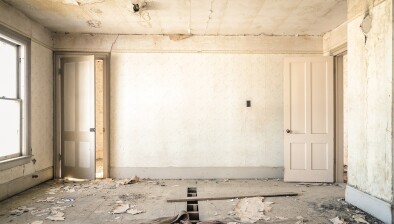Anas Sarwar: Scottish Labour would sell empty homes for £1

Anas Sarwar
A Scottish Labour government would create a scheme that would acquire empty homes and sell them to future homeowners for just £1, party leader Anas Sarwar has revealed.
Labour estimates around 27,000 homes in the country are considered to be empty, and Anas Sarwar used the first day of the party conference in Edinburgh to say it would reform compulsory purchase rules if elected at the 2026 Holyrood election.
The homes, he said, would be offered to those on low incomes or first-time buyers in a bid to improve communities and get people on to the housing ladder. A government-backed loan of up to £25,000, which would carry a low interest rate, would then be provided to transform the empty properties into homes.
Owners will be limited to one property each, and be required to live in the home for at least five years.
Mr Sawar said: “There is no single solution to the housing crisis. It means building more houses, with the right infrastructure in place - being innovative and ambitious in our plans.
“While thousands struggle to get on the housing ladder, there are empty and derelict houses blighting our neighbourhoods. We believe these need to put back into use to create new homes and revitalise and renergise communities.”
Labour said it would appoint a specific housing minister, with the goal of increasing home ownership, if elected.
The party’s housing spokesman Mark Griffin also announced an initiative that would be brought in by a Scottish Labour government that would increase the council tax on empty homes every year up to 500% of the original cost, raising an estimated £71 million that would fund the £1 homes programme.
Property firm DJ Alexander described the policy as the “latest politically-led housing gimmick” that fails to address the real underlying issues in the housing sector.
David Alexander, the chief executive officer of DJ Alexander Scotland Ltd, said: “This is an example of another shiny housing bauble placed before the electorate and designed to produce headlines and attract voters without addressing any of the underlying issues in the housing market.
“With so little detail it is hard to know what to make of these ideas but clearly this offers more questions than answers. Does this plan apply to both the private and social sectors and what is the process for identifying a long-term empty home? What kind of homes in Scotland are only worth £12,500 even under a compulsory purchase order and what checks are in place to ensure that these homes are actually abandoned or have simply been left dormant for a variety of legitimate reasons.
“While some long-term empty houses may be easily identifiable if they are run-down, neglected, and an obvious eyesore in the community many may be empty for perfectly legitimate reasons. A property that is empty for just 18 months may belong to an owner working abroad; someone in a care home; or there may be legal disputes over the settlement of a deceased’s estate; the property may be subject to delays for planning permission for alterations and development. Eighteen months is not a long time for a property to be empty so the notion that there are many thousands of properties lying vacant may be inaccurate and potentially open up multiple legal complications and difficulties.
“There is also the decision as to who should be given a home for a £1. For every person that benefits there will be hundreds who don’t so the selection criteria must be beyond reproach. The offer of government-backed loans to help the purchasers bring the properties up to standard also poses problems. If there is money to upgrade and renovate these properties it would be cheaper, and achieve better standards, if this work was undertaken nationally.
“The logical way to upgrade and renovate these homes would be for the central or local government to fund the refurbishment of the properties to ensure they met a common standard which would produce better properties and be more beneficial in the long term. Allowing buyers to choose their own quality of renovation might result in more sub-standard homes in the future.”
Mr Alexander added: “While this idea sounds like it should be a vote winner it is simply the latest in a long line of headline grabbing gimmicks. This will not resolve the current housing needs, it will not provide homes for those who need it, and it sounds like a way of renovating properties on the cheap, shifting the liability for these homes to the owners without providing sufficient funding to develop quality renovations.
“Until we get a government with a coherent housing plan, I fear we will lurch from one ill-conceived gimmick to the next none of which satisfies nor fulfils the current, or future, housing needs of Scots and where there is always the risk of making things worse.”






